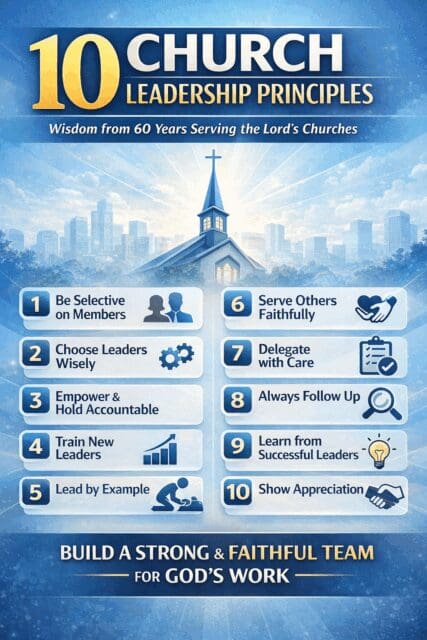Whether you’re talking about your business or a church, the principles for making it successful and effective are similar. Here is my short list of church leadership principles, based on nearly 60 years in serving the Lord’s churches.
10 Church Leadership Principles
1. Be selective on who joins your organization. Go for big numbers only and you will end up diluting the wine.
You wouldn’t employ a slob, a bum or a disruptive person for your company. Nor should a church receive as members those who show no indication of being Christ-followers. Churches might set up some kind of probationary period. Receive people as members but without full privileges for the first year. What privileges? Serving on committees, voting on motions, teaching classes. Then, at the end of the year, they and others who joined near the same time are received in a ceremony of some kind.
When someone asked for a Scripture on this, I responded, “You don’t need one. Some church leadership principles are no-brainers.” Lessons learned by long, sad experience. Receive anyone and everyone as members and you end up bringing the enemy into the inner works.
At the very least, a church should have a short interview with each person joining immediately after they present themselves. Also, church leaders could prepare a booklet spelling out the blessings and expectations of membership in this church.
2. Choosing leaders is the most important thing any group will ever do.
The second of our church leadership principles is that every group speaks volumes about itself by the character of the leadership it chooses. That, incidentally, applies to the United States just as it does to the local 4-H club or your Sunday School class.
Read 1 Timothy 3 and see the same for deacons.
A drunken senator was once nominated to the Supreme Court. When confronted with his problem, he said, “If confirmed, I promise to quit drinking.” No one bought that flimsy line, nor should a church choose as leader a person with a record of tearing up churches or breaking his marital vows. Forgiving someone is one thing, but trusting them with your valuables is another.
Scripture is filled with church leadership principles. You’ll find three from our Lord in Luke 16:10-12.
3. Empower those you choose as leaders to do their work well, yet hold them accountable at the same time.
I’ve known churches that required the pastor to get a church vote for anything costing over five dollars. And other churches which required him to get a committee approval for anything over a hundred.
Some churches need to learn that when they call someone as a pastor or staffer, they should give him/her room (and the means) to do their work and not erect obstacles, too many regulations or heavy burdens. I once brought a man onto our staff as business administrator. The first thing he did was propose that everyone fill out a form in triplicate to buy the first thing for our work.
I said, “John, please make it easier to do our work, not harder.” That was the end of the triplicate form.
Every pastor should meet with church leaders from time to time to discuss his work, to hear his heart and to advise him. Ideally, it should be a standing committee of a half dozen solid men and women. Call it “pastor support team” as one of my pastorates did, or something else entirely. But a pastor who is answerable to no one in the church is asking for trouble.


